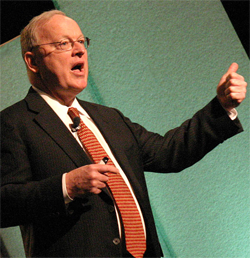
If you’re new to this series of advice to speakers, read the initial post, and it’ll help if you follow the chain.
It’s been three weeks since this series went on hiatus. This post is the fourth to come from notes taken by Randi Redmond Oster. And this post springs from advice given to me by Kent Bottles MD, whom I mentioned yesterday on pricing. (That’s him speechifying, at right.)
In addition to counseling me about price integrity, Kent’s the one who taught me that it’s my responsibility to find out what’s on the organizer’s mind – which often involves helping with the exploration. As I said in #2, “two thirds of good speaking is good listening.”
The consultative approach
You may have heard of “consultative selling,” a method that Wikipedia describes thus:
Rather than just promoting an existing product, the salesperson focuses on the customer’s pain(s) and addresses the issue with his or her offerings (product and services).
For you the “product” is your message. Rather than just promoting how great you think your message is, you focus on the customer’s world, the customer’s objectives and concerns. (As Wikipedia points out later, not every need is a “pain.”)
It’s easy to understand this approach if you believe in patient-centered care.
We want medicine to think not just about the profession’s view of things; we want to be heard, we want our needs to be understood. Amazingly, the same’s pretty much true for everyone. So do unto others as you’d have them do unto you: listen.
I schedule a call in the weeks leading up to the event to discuss this. And toward the end of the call, we always come around to this question:
“What outcome would make you say, ‘You really knocked it out of the park’?”
If you’re not familiar with that baseball expression, again see Wikipedia)
This question helps clients dream a bit – legitimately – and in most cases helps move their thought process forward. Here are examples various clients have given me this year at the end of our calls:
- “For the leaders to go back to their hospitals and start actively looking at what they’re doing to make patient engagement a reality”
- “Have them come away feeling they can make a difference and engage patients”
- “Have them shift to thinking, what does the patient need? What does the patient think about?”
- “Realize that the best care is increasingly about communication with the patient”
All of these are legitimate objectives, right? But they’re substantially different. So think about this: what if you think your audience cares mainly about one, but actually cares more about another? That’s why it’s your job to find out.
Then, during the speech, whatever points you make, tie them to that objective. Help them see how your point applies to their concerns.
Randi describes all this with the business principle of “managing expectations.” That is indeed one way of looking at it – but it works best if you don’t just manage the expectations, you actively help develop them.
Next in the series: #6: What could be said that would make any difference?


Great advice! And while it applies very much to the job of using public speaking to raise consciousness to spark action toward empowering patients in a participatory medicine model, it’s also good advice for so many other situations in life. It’s very hard to know what the other person expects…or hopes for…unless you ask and really, truly listen. And it’s very hard to work toward a shared goal…if both sides haven’t fully shared what their goals are.
Exactly, Francie – as I said, this is nothing more nor less than what patient advocates mean by “patient centered care.” No matter how good a person’s intentions are, it’s likely to miss the mark if it’s not something the other person feels is important.
How long on average are your pre-event consultation calls? Do you have a set list of questions or do you research the “realm” and ask questions specific to them?
I would ask permission to record the call so I could be fully engaged as opposed to taking notes and listening. I would ask them permission to record it and explain that the recording would only be used to help me prepare for the event – and then destroyed.
You don’t even need to ask me this, Karen. :) Just go for it.
Don’t you dare try to use this series as a cookbook. :-) If you do you’ll fail, because the point isn’t what I did, it’s the idea of listening to your audience in general, and listening to every single person as an individual.
You know what patient-centered care is: it’s when the doctors and nurses find out what’s important to you, what you care about, and LISTEN to what you say. So, your job here is to flip that: find out what’s important to them, and LISTEN to what they say.
Awesome point. :) I will not use this series as a cookbook. I like your sense of humor, btw.